Studying Regional Variations in Globalization
archive

Studying Regional Variations in Globalization
We would expect to find that people view globalization differently depending on where they live. While an international opinion survey would probably be the preferable way to measure these differences in understanding, this article proposes a much cheaper proxy: freely available information about books on the topic of globalization that people buy in online stores around the world. Using this data is clearly inferior to a well-designed opinion survey in that it cannot provide answers to a full set of research questions, but it can tell us which aspects of globalization are perceived to be important in different regions of the world, and it might illuminate the structure of popular discussions about globalization. It also has the advantages of being non-invasive and of capturing the whole population of users of a popular online bookstore, probably more than could be reached by an opinion survey. Of course, given that this data is about the purchasing choices made by individuals among books offered by publishers, it is something of a halfway house between individuals’ views of globalization—such as might be expressed in answers to an opinion survey or in postings on social media—and the views of globalization produced and promoted by the media and publishing industries. Enough caveats: what can the data tell us?
Amazon currently has 11 stores: Brazil, Canada, China, France, Germany, India, Italy, Japan, Spain, the UK, and the US. Of these all but the Brazilian and Indian stores offer an API that allows automatic searching. We therefore wrote a program that retrieved the top 100 books with the keyword “globalization” (or the equivalent in the relevant language) every day from these nine Amazon stores and archived the results in a database. This should be done over a period of at least several months to overcome temporary biases toward particular titles. However, as a proof of concept this article presents some results based on 15 days of data from June 2013.
Book titles
First, let us look at the words used in the titles of the books. We removed words such as “globalization,” “global,” “world,” “international,” “introduction,” and “edition.” Then we combined parts of speech and near-synonyms such as “politics”/“political” and “economy”/“economics.” Finally we calculated word frequencies. Rather than present tables of dry figures, we visualized the 50 most frequently occurring words in each store using wordle.net; Japanese and Chinese need some extra processing before analysis is possible so are omitted here.
Figure 1: Globalization book title keywords in seven Amazon.com markets: Canada, France, Germany, Italy, Spain, United Kingdom, United States
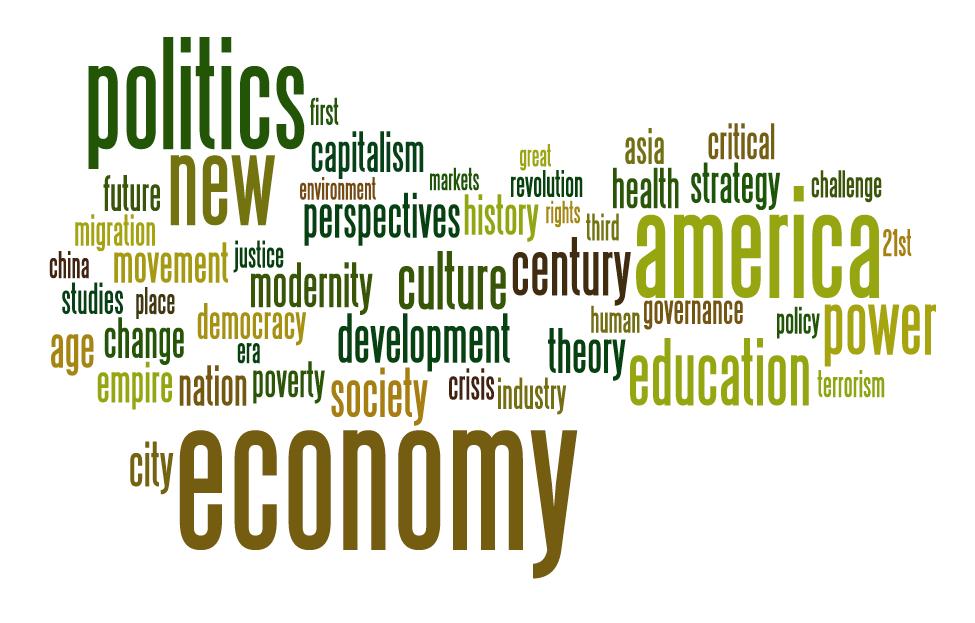

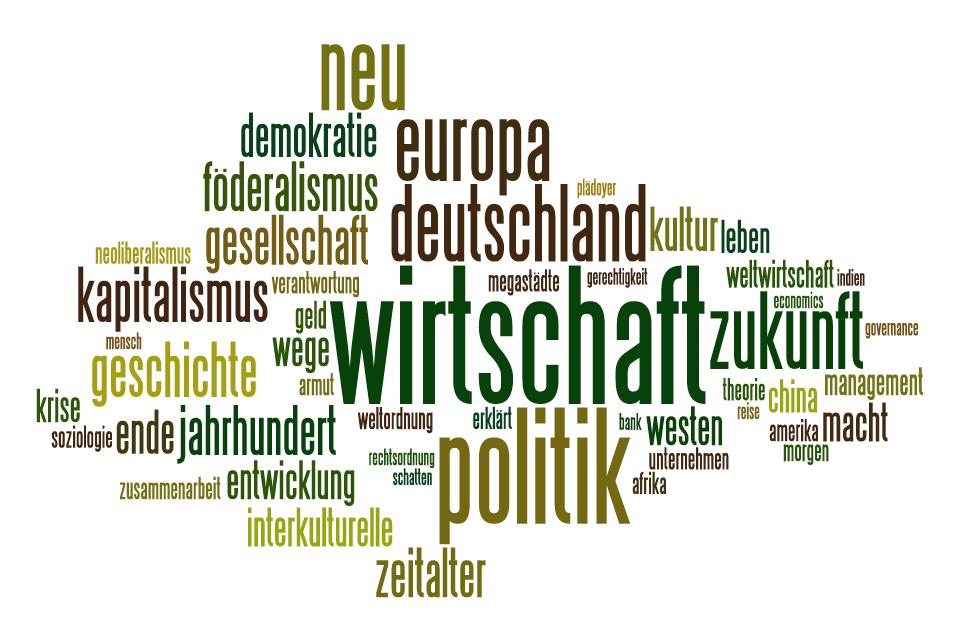
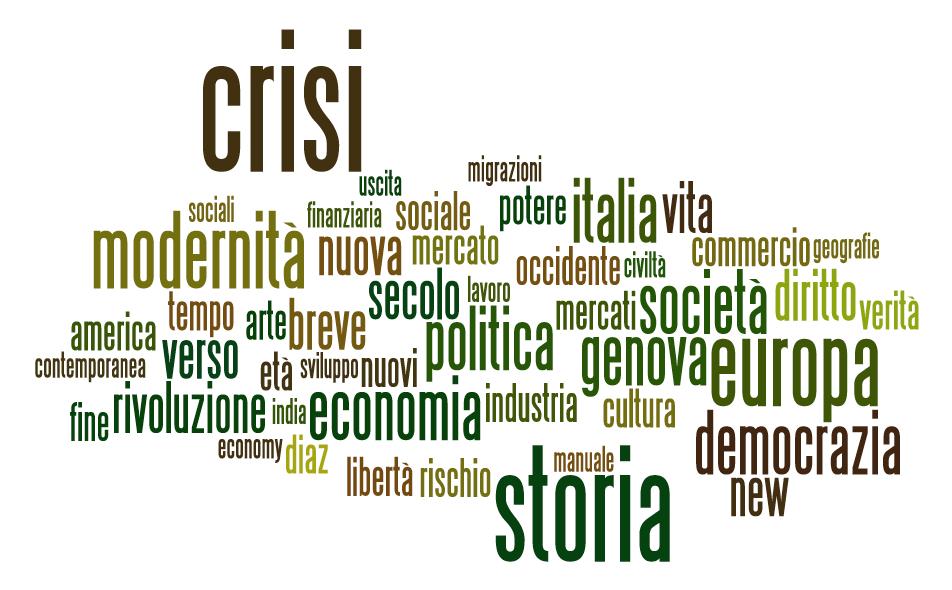
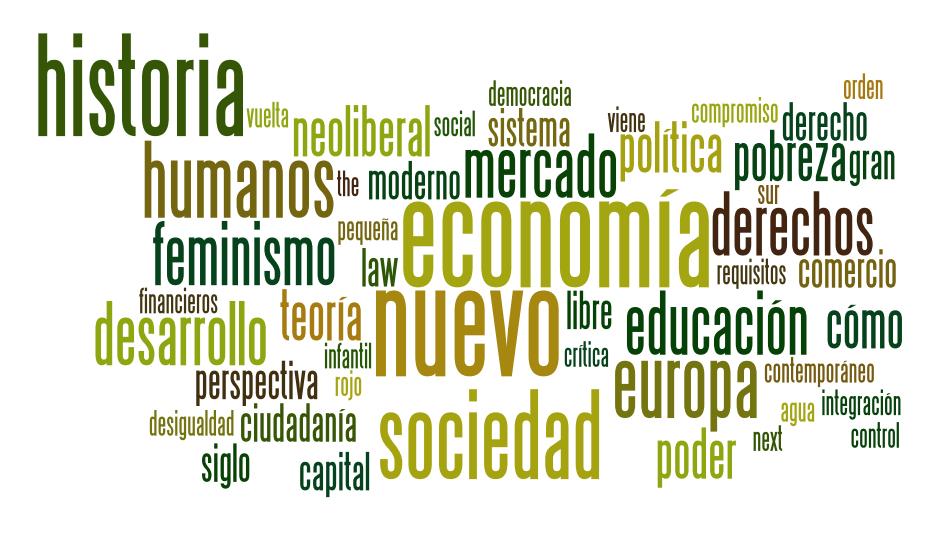
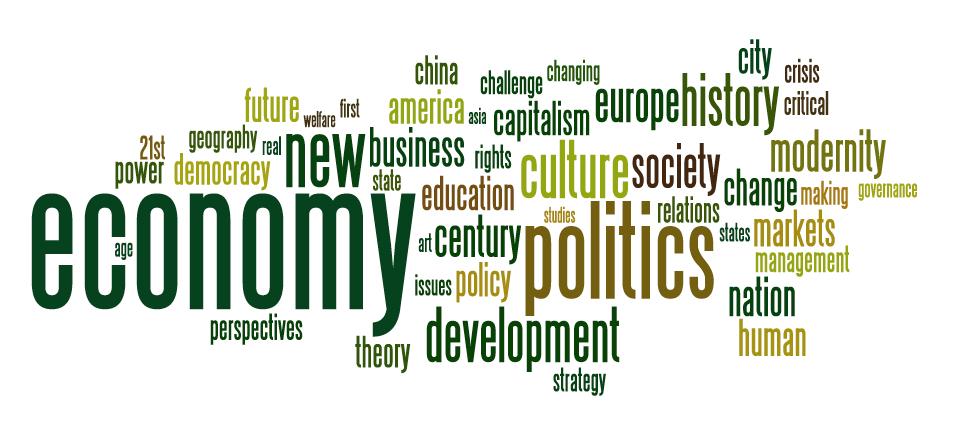

Clearly, book purchasers in all the stores are extremely interested in the economic aspects of globalization. The Italian store shows an unusually high association of globalization with “crisis,” which occurs in 11 of the 150 book titles collected. It will be interesting to see whether this association continues over a longer period.
It is also interesting to compare the balance between “future” and “history.” While for Canada, Germany, the UK, and the US the two are more or less the same size, for France, Italy, and Spain we see only “history.” Book titles everywhere tend to emphasize the newness of globalization.
...freely available information about books on the topic of globalization that people buy in online stores around the world… cannot provide answers to a full set of research questions, but it can tell us which aspects of globalization are perceived to be important in different regions of the world.
We also notice differences in the geopolitical associations of globalization. In the US and Canadian stores, “America” is a large presence, with “China” (plus “Asia” for Canada) just making the cut. “Europe” features prominently in all the European stores. The German and Italian stores show the greatest geographical diversity, with China, America, Africa, India, and the West joining Europe and the two home countries. The French results include “France,” “Europe,” and “Africa,” while those for the Spanish store include only “Europe.”
Co-purchasing networks
This simple analysis of the text of book titles has revealed some interesting regional variations, but we would like to get a better sense of the issues associated with globalization in different countries. When we browse in an Amazon store we see co-purchasing information (“Customers Who Bought This Item Also Bought…”). By gathering this information for each book returned in the search results for “globalization,” we can see which topics are closely associated with globalization in the different book markets. These co-purchasing data can also suggest the structure of debates about globalization in different regions: following Kreb’s analysis of political book purchases around the 2008 US presidential election (http://www.orgnet.com/divided.html), will we see mutually unconnected “islands” of texts suggesting a polarized or fragmented popular understanding of globalization or a community of readers linked by knowledge (or at least ownership) of common texts?
In the interest of brevity, here we will confine ourselves to comparing co-purchasing networks from the German, Japanese, and US stores. In the network diagrams that follow, the red nodes are books that have been returned in the search results for “globalization” and the blue nodes are books that have also been purchased by people who have bought books on globalization. The larger the node, the higher the book’s mean sales ranking over the two-week period in June 2013. The networks have been restricted to the 200 books with the highest mean sales rankings. Smaller components (“islands”) have been omitted. The words in large font size are labels we have subjectively attached to sub-groups of books within each network in an attempt to give a broad sense of their content; the reader is invited to improve these thematic labels. Titles and authors of individual books can be seen by clicking on the image.
Figure 2: Co-purchasing networks in three Amazon.com markets: Germany, Japan, USA
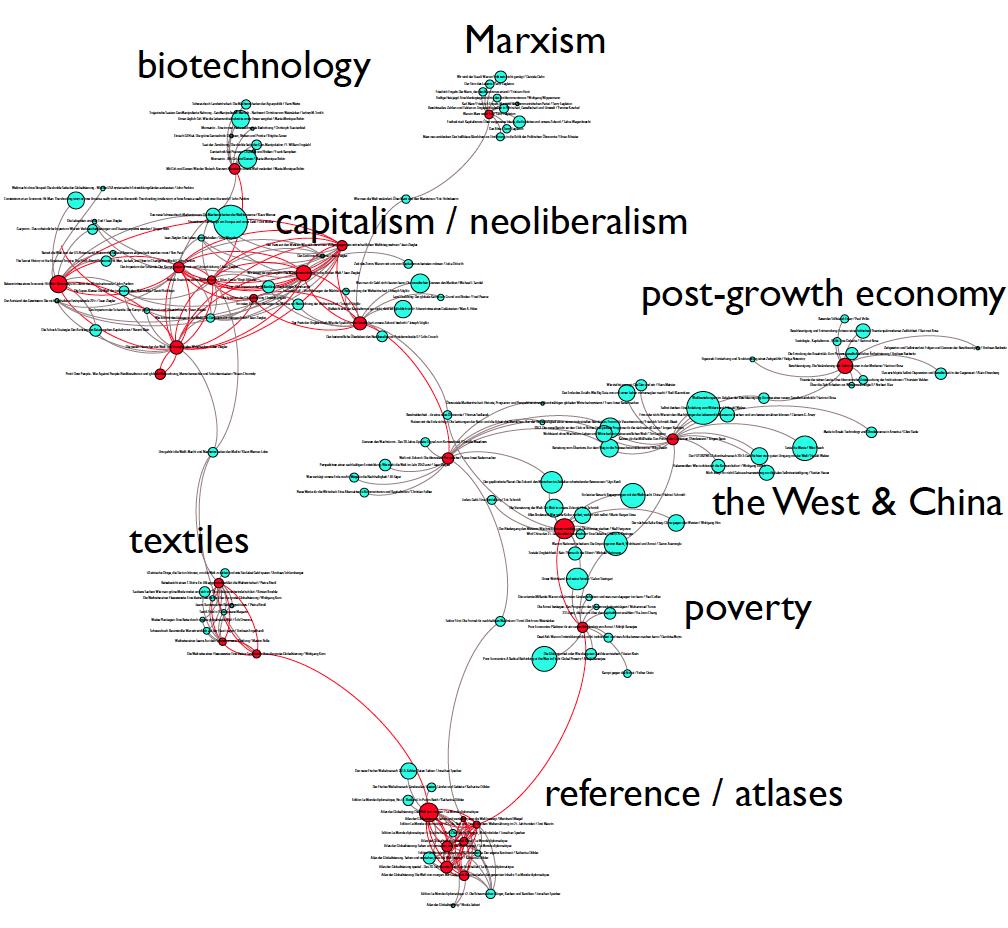
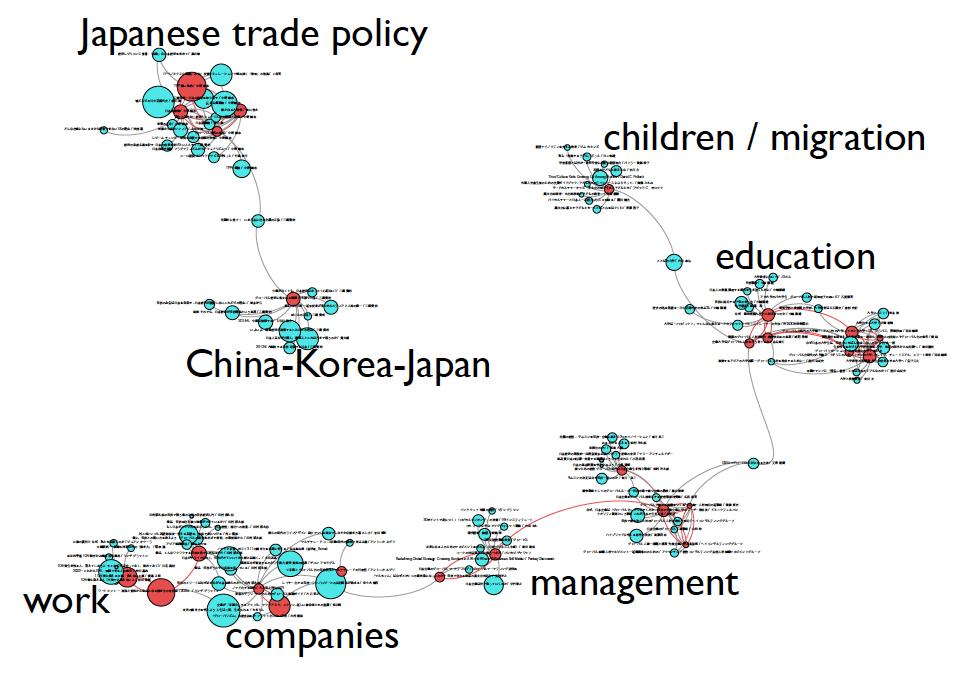
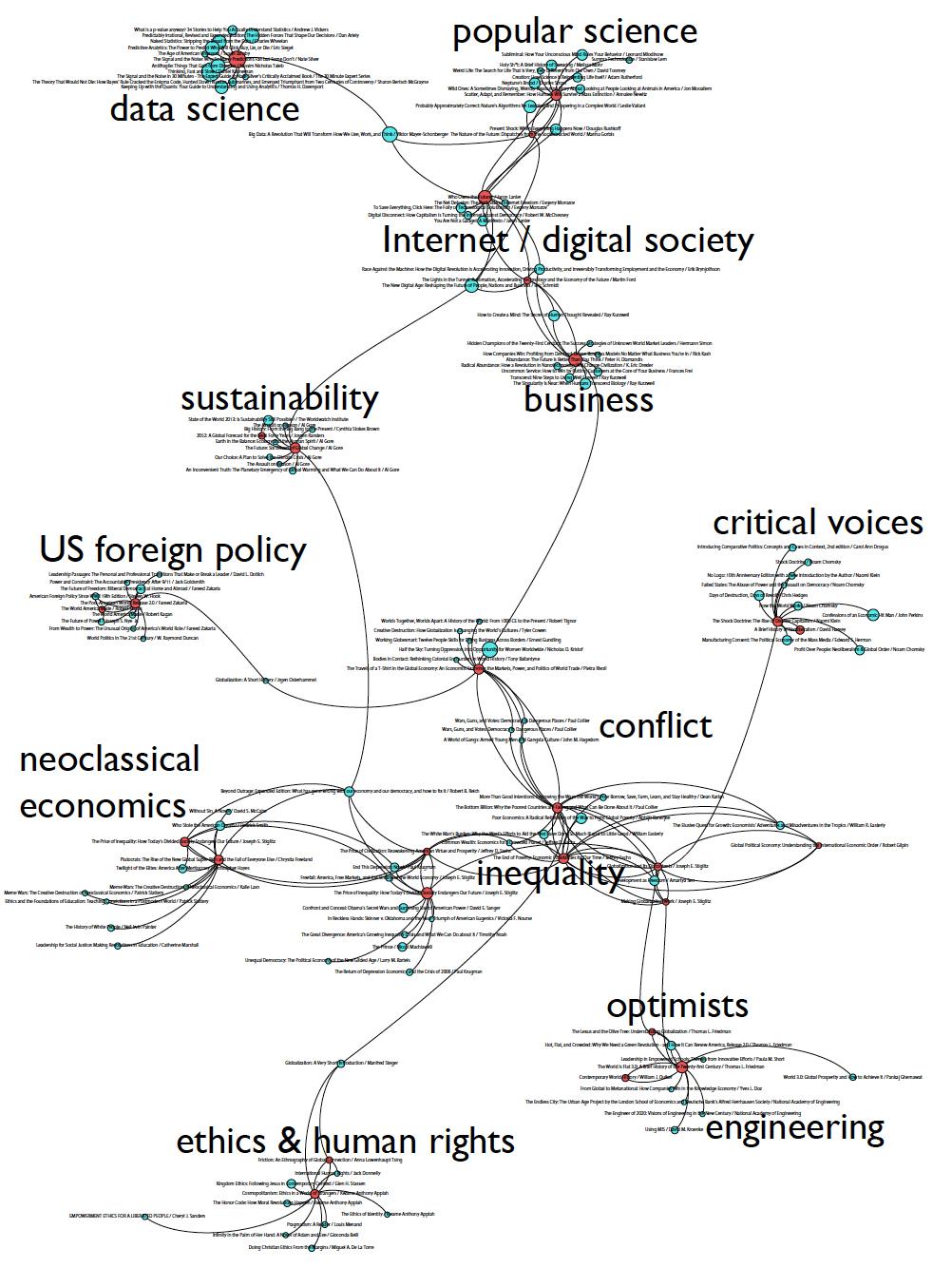
The first thing we notice is that the German and US networks consist of one large component whereas the Japanese network is split into two components; the slightly smaller Japanese component is concerned with trade policy—including books debating the Trans-Pacific Strategic Economic Partnership—and Japan’s relations with its neighbors. The other component centers on business and management, but also includes books aimed at people concerned about the impact of globalization on their workplace and books on university education and the children of migrants living in Japan. Poverty, inequality, and the environment are not major topics.
These co-purchasing data can also suggest the structure of debates about globalization in different regions...
By contrast, the German and US store networks both have one large component that includes multiple perspectives on globalization ranging from the highly critical accounts of Jean Ziegler and Noam Chomsky to the more optimistic positions taken by, for example, Thomas Friedman. This suggests that the debate on globalization in those countries is lively but not completely polarized. Nevertheless, the overall tone of the best-selling German books on globalization and the titles bought along with them is considerably more skeptical of the benefits of globalization than that in the US store.
Final word
The preliminary results presented in this article suggest that using purchasing data from online book stores, despite its limitations, is a promising way of estimating what people in a given country are likely to understand by and associate with globalization. In order to present firm conclusions we need to gather data over a longer period, and it would be desirable to expand the coverage to include other regions and countries.



